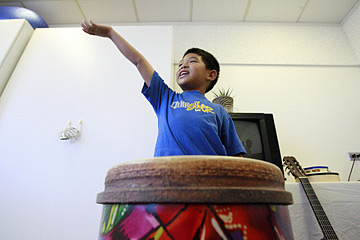
CINDY ELLEN RUSSELL / CRUSSELL@STARBULLETIN.COM
Dylan Kaulukou-Chang belted out a song during a session at Sounding-Joy Music Therapy, Inc. He's shown below right, with program founder and therapist Keiko Kajiwara, and at left, interacting with music therapist Karen Kei during a session.
|
|
Music makes good medicine
Specialists extol the benefits of music therapy for disabled and abused kids
DYLAN KAULUKOU-CHANG banged drums, played a piano, shook a tambourine. A drumstick served as his microphone. Typical behavior, you'd think, for a kid turned loose in a roomful of musical instruments. But Dylan is autistic, and such freedom of expression is normally difficult for him.
For six months, Dylan has been engaging in music therapy sessions at Sounding Joy Music Therapy.
"He always looks forward to coming here," said his mother, Lisa Kaulukou-Chang. "He just brightens up. It's helping him express himself more effectively. The singing helps with speech and language.
"I tried enrolling him in soccer, but it didn't work for him. He likes more individualized activities."
Because music therapy is a nonthreatening medium, unique outcomes are possible, explained Keiko Kajiwara, the music therapist who founded and runs the Sounding Joy studio.

CINDY ELLEN RUSSELL / CRUSSELL@STARBULLETIN.COM
Dylan Kaulukou-Chang interacting with music therapist Karen Kei during a session.
|
|
When Dylan started, he would repeat phrases, and there was a lot of spontaneous speaking. "He would randomly blurt out things," Kajiwara said. "Now, he responds more effectively. He can learn more complex things. ... His focus and attention span are better."
When Kajiwara moved to the islands in 2000 from New York, she saw the need for music therapy. "I started on my own and there was an overwhelming response. Music therapy has been around for about 50 years, but it is kind of new in Hawaii," she said.
The state has only four clinicians out of the more than 5,000 practicing therapists nationwide, making Hawaii one of the most underserved states, she said.
Music therapy includes the use of behavioral, biomedical, developmental, educational, humanistic and adaptive music instruction. It addresses physical, emotional, cognitive and social needs of individuals.
The therapy is used to treat an array of developmental disorders, including Down syndrome and attention deficit hyperactivity disorder, and is used to help abused children.
Kajiwara also began working with senior citizens this year. Through grant projects, Kajiwara has been providing elderly residents in the Hawaii Kai Retirement Community with therapeutic musical activities.
"We do lots of singing. There is a speech domain in the brain, and it helps with speech problems," said Kajiwara. "We believe the power of music can transform lives significantly."
Music has been proven effective in affecting blood pressure, respiration, pulse rate and more, according to Arthur Harvey, former University of Hawaii music professor, researcher and educator in music therapy.
"Music is a versatile health-care intervention. It helps people of all ages, from neonatal to geriatric," he said. "Many times, emotions override attention or behavior. Music has an emotional element attached to it."
Music also allows an opportunity for expression, when words cannot be used.
Whether a disability or special need is an issue, "music provides some kind of positive response," Harvey explained. "It is a healthy, nonaddictive way to reduce stress."

CINDY ELLEN RUSSELL / CRUSSELL@STARBULLETIN.COM
Dylan Kaulukou-Chang, right, with program founder and therapist Keiko Kajiwara.
|
|
All types of music incorporate sound, harmony, rhythm, melody and form -- making them beneficial in therapy, he said. "But the classics, new-age and folk music seem to have the best benefit. Baroque and classical particularly make the cognitive process more effective."
Harvey agreed that Hawaii is underrepresented in the area of music therapy. "It is a different concept of health care. ... It takes time to sell the community," he said.
He hopes that awareness will prompt the University of Hawaii's medical school to incorporate music therapy into its complementary and alternative medicine programs.
"Joys of Sounds, Sounds of Joy," a two-day conference in April, touched on an array of issues -- including the use of music therapy for developmentally delayed and multiple-handicapped children, for children with cochlear implants and to promote both psychological and physiological health.
Harvey has taught and provided therapy for 45 years. At Leahi Hospital, patients sing and play percussion instruments, accompanied by Harvey on trumpet, trombone or piano. "Each patient has a different response, but all are positive responses," he said.

CINDY ELLEN RUSSELL / CRUSSELL@STARBULLETIN.COM
Dylan Kaulukou-Chang participates in music therapy to help with his autistism.
|
|
Harvey also has seen how music helps children who have disabilities and attention deficit disorders.
At the family level, music can be made part of daily life, especially during transitional periods, such as while driving, at mealtime and at bedtime. Singing, chanting and rapping are all effective.
Anything can be taught or expressed this way -- consider how most children learned their ABCs through a simple tune, he explained. "The information goes into the brain differently when you talk."
A child with special needs will not be cured by music therapy, but will learn to function at a much higher level, Harvey said.
"It is hard to predict how quickly changes will occur," he said, but the results might be worth the wait.
Studies have shown that music can help alleviate pain, express feelings, promote wellness, reduce stress, enhance memory, improve communication and promote physical rehabilitation. It can improve the quality of life for all individuals.
Harvey added, "Music is fun and practical. ... You just need to find something that makes you feel better."

